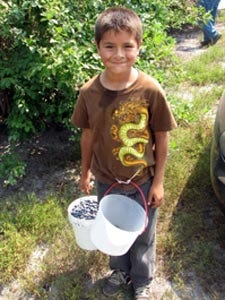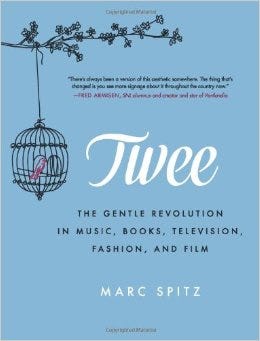So What, Who Cares (vol 2, issue 7) How cows could become enemies of the U.S. plate
Hello! It's occurred to me that I name-check a lot of specific books and other media in So What, Who Cares? Is there any interest in an Amazon list or some other central repository of all the media I mention on here, just so you have it all in one place? Let me know via email or Twitter.
*
If an advisory panel to the Agriculture and Health and Human Services Departments has its way, the phrase "You are what you eat" might expand to include "... And how it was made." As the Associated Press reports:
The government issues dietary guidelines every five years to encourage Americans to eat healthier. This year's version may look at what is healthy for the environment, too.
A new focus on the environment would mean asking people to choose more fruits, vegetables, nuts, whole grains and other plant-based foods - possibly at the expense of meat.
The big reasons for considering the altering the recommendations include reducing diet-related health ailments and reducing environmental impact. It's not looking good for beef -- a study in the Proceedings of the National Academy of Sciences called out cows last year for producing more heat-trapping gases and more water-polluting nitrogen, while also requiring more water and more land. (The founder of Niman Ranch vigorously disputes this study.)
So what? The U.S. government giving some weight to food's environmental impact is a forward-thinking approach to the rapidly changing conditions in agriculture and rapidly changing demands of consumers.
American agriculture has already come under fire for rampant antibiotic use and its environmental effects, and a year of crazy climate-related news has had more forward-looking agricultural types thinking about "climate-smart agriculture," which focuses on how to farm in increasingly erratic weather, with less water and with smaller environmental footprints.
A set of government guidelines that requires people to think about how their diet affects the planet is a way to change how people think about the food they eat -- and what they expect from the people who grow it.
Who cares? Big agriculture, small agriculture, and the people who work in both. If environmental impact is factored into the diet, what's next? It's handy to remember that Slow Food is not just about eating locally -- it's also about worker conditions.

In addition to scrutiny over the conditions of livestock, there is a small but growing body of scholars and social critics who are examining the conditions of the children workers who pick the crops or work in the slaughterhouses. Consumers are putting their money where their morals are when it comes to food marketed as "local, alternative, sustainable, and fair" -- perhaps the next tenet in ethical food consumerism will be "workers' labor conditions."
(As the U.S. government is already advocating, "Know Your Farmer, Know Your Food.")
Additional reading: I recently got The Third Plate: Field Notes on the Future of Food by Dan Barber, and as a read, it's shaping up to be a sustained argument for changing what we think of as a "standard diet" for the sake of the environment. Sample quote:
Eroding soils, falling water tables for irrigation, collapsing fisheries, shrinking forests, and deteriorating grasslands represent only a handful of the environmental problems wrought by our food system —problems that will continue to multiply with rising temperatures.
I would expect to see more of Barber in the food-as-public-policy dialogue soon; the notion of a diet for a small planet is due for a resurgence.
*
Your pop culture note of the day: First up -- ugh, I noticed that I left a hyphen in yesterday's tag, which confirms that I need to write a SW,WC style guide so I can impose some semblance of consistency upon this newsletter. My apologies to all of you whose copyediting gene was switched on during fetal development.
So last night's Shark Tank featured an update on a business one of the sharks invested in, Spy Escape and Evasion, and as I watched, I wondered, "Why would you do this again?" The answer: Because it might be a stepping stone to an illustrious career as a hitwoman. Today's story, "NASCAR's Kurt Busch Testifies That Ex-Girlfriend Is An Assassin," is simply fascinating, especially with details like:
Busch offered up specific examples of her returning from missions, sometimes with bruises.
Once, he said, they were in El Paso, Texas, where Driscoll had left that night in camouflage and boots. She returned later to the hotel at which he was staying wearing a trench coat. Under it she was wearing an evening gown splattered with blood and other matter, Busch testified.
Neither Driscoll nor her attorney refuted the claims during the hearing.
There is no way this is not going to get a movie treatment.
Also, can we talk about last night's Shark Tank? I have many, many strong feelings about Scratch & Grain. Let's share via email or Twitter.
*

Your anticipatory pop culture note of the day: My gleeful consumption of pop culture has been slowed considerably as I struggle to get through Mark Spitz's Twee: The Gentle Revolution on Music, Books, Television, Fashion and Film, a book I would not have known about if longtime friend and all-around smart person @tygerbox had not sent me a link to the Morning Edition piece "Beyond The Bird On It: 'Twee Is About Shopping.'" I'm pretty sure he did it because it's fun to watch me sputter in real time.
Why am I reading this? Because I am fascinated by analyses of the relationship between any defined subculture and consumption (See also: vol 1, issue 39; vol 1, issue 60), and because this book is part of a wider body of work on the emerging "authenticity" mass market.
If it makes you feel better, after I stop writing all-caps Kindle notes in response to quotes like "Unlike Punk or Hip-Hop, an aspiring tribal Twee cannot get there simply via haircut or by turning one’s baseball cap around," I'll be revisiting Emily Matchar's Homeward Bound: Why Women Are Embracing the New Domesticity and Andrew Potter's The Authenticity Hoax: Why the "Real" Things We Seek Don't Make Us Happy. And I'll be on the lookout for the SW,WC angle on twee.
In the meantime, I have to restrain myself from re-reading Legs McNeil's Please Kill Me: The Uncensored Oral History of Punk; Jeff Chang's Can't Stop Won't Stop: A History of the Hip-Hop Generation; Mark Yarm's Everybody Loves Our Town: An Oral History of Grunge; Greg Prato's Grunge Is Dead: The Oral History of Seattle Rock Music; and Lisa's Chamberlain's Slackonomics: Generation X in the Age of Creative Destruction.
All of these touch on specific cultural movements and/or generational zeitgeists, and the commodification thereof. None are mentioned in Twee's bibliography.
*
Did you miss an issue of So What, Who Cares? The archive is here. Are there typos? I apologize in advance.
As always, I welcome your feedback and suggestions via email or Twitter. Always let me know what you think about So What, Who Cares? If you really like it, tell a friend to subscribe.


